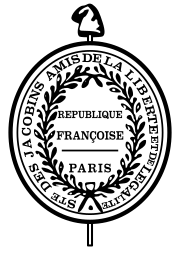
Back Jakobyn Afrikaans Jakobiner ALS نادي اليعاقبة Arabic الجاكوبيين ARZ Yakobinlər Azerbaijani Якабінцы Byelorussian Якобинци Bulgarian জ্যাকোবিন ক্লাব Bengali/Bangla Kleub ar Jakobined Breton Jakobinci BS
Club des Jacobins | |
 Seal of the Jacobin Club (1792–1794) | |
| Successor | Panthéon Club |
|---|---|
| Formation | 1789 |
| Founder | Various deputies of the National Convention |
| Founded at | Palace of Versailles, France |
| Dissolved | 12 November 1794 |
| Type | Parliamentary group |
| Legal status | Inactive |
| Purpose | Establishment of a Jacobin society
|
| Headquarters | Dominican convent, Rue Saint-Honoré, Paris |
Region | France |
| Methods | From democratic initiatives to public acts of political violence |
Membership (1793) | Around 500,000[1] |
Official language | French |
President | Antoine Barnave (first) Maximilien Robespierre (last) |
Key people | Brissot, Robespierre, Duport, Marat, Desmoulins, Mirabeau, Danton, Billaud-Varenne, Barras, Collot d'Herbois, Saint-Just |
| Subsidiaries | Newspapers
|
| Affiliations | All groups in the National Convention |
| Part of a series on |
| Radicalism |
|---|
 |
| This article is part of a series on |
| Liberalism in France |
|---|
 |
The Society of the Friends of the Constitution (French: Société des amis de la Constitution), renamed the Society of the Jacobins, Friends of Freedom and Equality (Société des Jacobins, amis de la liberté et de l'égalité) after 1792 and commonly known as the Jacobin Club (Club des Jacobins) or simply the Jacobins (/ˈdʒækəbɪn/; French: [ʒakɔbɛ̃]), was the most influential political club during the French Revolution of 1789. The period of its political ascendancy includes the Reign of Terror, during which well over 10,000 people were put on trial and executed in France, many for political crimes.
Initially founded in 1789 by anti-royalist deputies from Brittany, the club grew into a nationwide republican movement with a membership estimated at a half million or more.[1] The Jacobin Club was heterogeneous and included both prominent parliamentary factions of the early 1790s: The Mountain and the Girondins.[3] In 1792–93, the Girondins were more prominent in leading France when they declared war on Austria and on Prussia, overthrew King Louis XVI, and set up the French First Republic. In May 1793, the leaders of the Mountain faction, led by Maximilien Robespierre, succeeded in sidelining the Girondin faction and controlled the government until July 1794. Their time in government featured high levels of political violence, and for this reason the period of the Jacobin/Mountain government is identified as the Reign of Terror. In October 1793, 21 prominent Girondins were guillotined. The Mountain-dominated government executed 17,000 opponents nationwide as a way to suppress the Vendée insurrection and the Federalist revolts, and to deter recurrences. In July 1794, the National Convention pushed the administration of Robespierre and his allies out of power and had Robespierre and 21 associates executed. In November 1794, the Jacobin Club closed.
In the years and decades after the revolution, the term Jacobin was used in an extended sense to denote political positions perceived as similar to those of the historical Jacobins and the Mountain in the National Convention. It was popular among conservative publicists as a pejorative to deride progressive politics, and among Anglophone progressives likewise as a pejorative denoting the violent excesses of the revolution, whereas they associated its positive features and principles with the Girondins.[4] In Britain, the term faintly echoed[citation needed] negative connotations of Jacobitism, the pro-Catholic, monarchist, rarely[citation needed] insurrectional political movement that faded out decades earlier tied to deposed King James II of England and his descendants. The term Jacobin reached obsolescence and supersedence before the Russian Revolution, when the terms (Radical) Marxism, anarchism, socialism, and communism had overtaken it.[citation needed]
In modern France, the term Jacobin generally denotes a position of more equal formal rights, centralization, and moderate authoritarianism.[5][need quotation to verify] It can be used to denote supporters of a role of the state in the transformation of society.[6] It is, in particular, used as a self-identification by proponents of a state education system that strongly promotes and inculcates civic values. It is more controversially used by or for proponents of a strong nation-state capable of resisting undesirable foreign interference.[7]
- ^ a b Brinton, Crane (2011) [1930]. The Jacobins: An Essay in the New History. Transaction Publishers. p. xix. ISBN 9781412848107. Retrieved 16 April 2015.
- ^ "Journal de la Montagne". Paris: Bibliothèque nationale de France. 1 January 2021. Retrieved 10 May 2021
- ^ "Montagnard | French history". Encyclopaedia Britannica. 2022. Retrieved 29 March 2022.
- ^ Brown, Charles Brockden (2009) [1799]. Barnard, Philip; Shapiro, Stephen (eds.). Ormond; or The Secret Witness: with Related Texts. Indianapolis: Hackett Publishing. p. 360. ISBN 978-1-6038-4126-9.
- ^ Rey, Alain, ed. (1992). Dictionnaire historique de la langue française (in French). Dictionnaires Le Robert. ISBN 978-2321000679.
- ^ Furet, François; Ozouf, Mona (2007). Dictionnaire critique de la Révolution française: Idées. Champs (in French). Vol. 267. Paris: Flammarion. p. 243. ISBN 978-2081202955.
- ^ Furet, François (1988). "Jacobinism". In Furet, François; Ozouf, Mona (eds.). A Critical Dictionary of the French Revolution [Dictionnaire critique de la révolution française]. Translated by Goldhammer, Arthur. Cambridge, Massachusetts: Harvard University Press (published 1989). p. 710. ISBN 9780674177284. Retrieved 17 February 2019.
The semantic elasticity of the term in late twentieth-century French politics attests to the work of time. 'Jacobinism' or 'Jacobin' can now refer to a wide range of predilections: indivisible national sovereignty, a state role in the transformation of society, centralization of the government and bureaucracy, equality among citizens guaranteed by uniformity of the law, regeneration through education in republican schools, or simply an anxious concern for national independence. This vague range of meanings is still dominated, however, by the central figure of a sovereign and indivisible public authority with power over civil society [...].